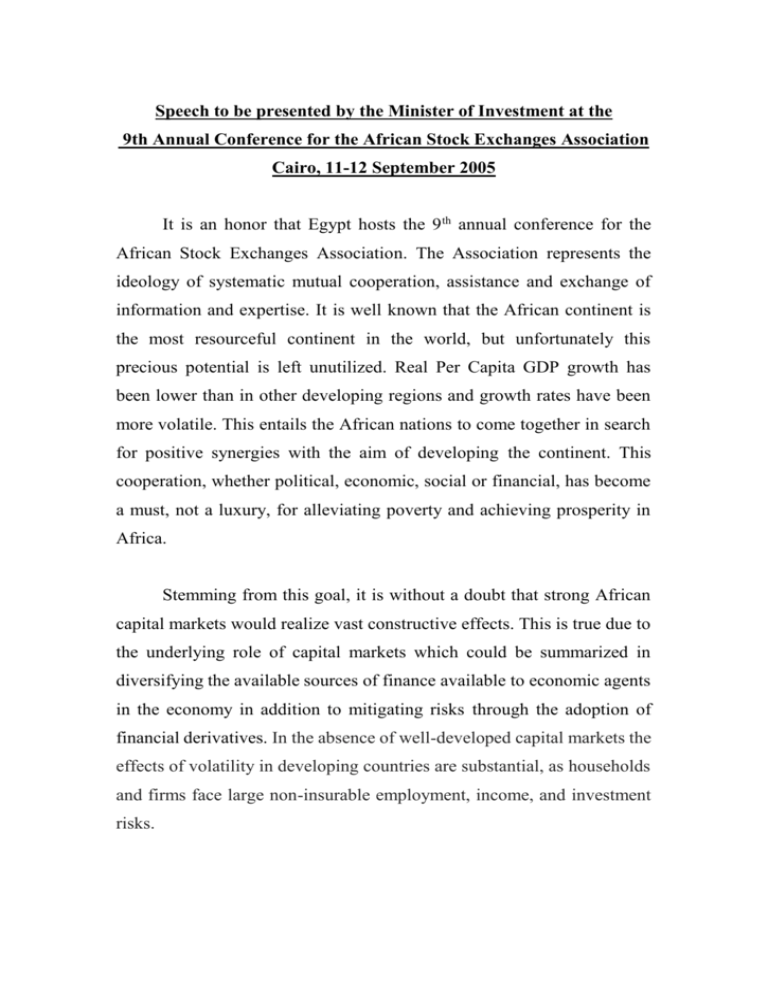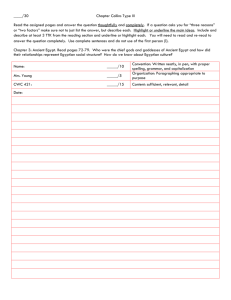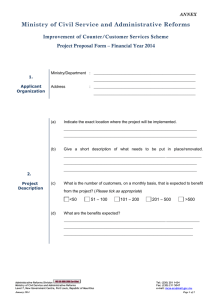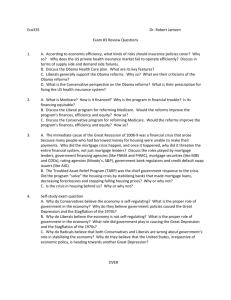H E Dr Mahmoud Mohi ElDin Minister Of Investment Egypt
advertisement

Speech to be presented by the Minister of Investment at the 9th Annual Conference for the African Stock Exchanges Association Cairo, 11-12 September 2005 It is an honor that Egypt hosts the 9 th annual conference for the African Stock Exchanges Association. The Association represents the ideology of systematic mutual cooperation, assistance and exchange of information and expertise. It is well known that the African continent is the most resourceful continent in the world, but unfortunately this precious potential is left unutilized. Real Per Capita GDP growth has been lower than in other developing regions and growth rates have been more volatile. This entails the African nations to come together in search for positive synergies with the aim of developing the continent. This cooperation, whether political, economic, social or financial, has become a must, not a luxury, for alleviating poverty and achieving prosperity in Africa. Stemming from this goal, it is without a doubt that strong African capital markets would realize vast constructive effects. This is true due to the underlying role of capital markets which could be summarized in diversifying the available sources of finance available to economic agents in the economy in addition to mitigating risks through the adoption of financial derivatives. In the absence of well-developed capital markets the effects of volatility in developing countries are substantial, as households and firms face large non-insurable employment, income, and investment risks. Once more, I would like to reiterate my pleasure to host this conference, and I consider it an opportune chance for me to present you with some of the recent reforms implemented by the Government of Egypt and the Ministry of Investment with respect to the financial sector. Some of these reforms are broad based reforms that affect all the institutions in the financial sector and others are sector specific. Broad based reforms (corporate governance, information dissemination and transparency): It could be said that it is widely accepted nowadays that recent events starting with Enron scandal and followed with a series of revelations of companies misrepresenting their financial statements plagued investors confidence in the sort information provided to them to build on their financial decision. This highlighted the high importance of corporate governance whether in developed or developing markets. Recognizing this crucial point, the Ministry of Investment is undertaking the responsibility of establishing the Institute of Directors (IOD). The IOD will soon issue the first code of corporate governance principles to listed firms. Additionally, the IOD will also issue guidelines on the corporate governance of the state-owned enterprises based on the OECD principles. And to ensure the implementation of the corporate governance principles, the IOD will provide training and education to promote high professional standards particularly for boards of directors regarding the application of corporate governance principles. Additionally, a new law is being drafted and expected to be ratified in the next parliamentary session concerning "Disclosure and Information Dissemination". This law would be a cornerstone in the process of enhancing transparency in the Egyptian market as it will set the responsibilities of the various agencies with respect to provides the public with timely, accurate and factual information and data. Insurance Market: The insurance sector is considered a vital component to the Egyptian economy; it provides a mean of mitigating and diversifying risk for Egyptian and foreign businesses. Stemming from this crucial role, the Ministry of Investment started a comprehensive program for reforming the whole sector. The components of the program touched almost every aspect in the insurance market. Starting with regulatory and legislative reforms, several new calibers have been introduced in the Egyptian Insurance Supervisory Authority to promote the liberal and market oriented approach of the new government of Egypt. Additionally, several new laws have been approved or expected to be approved by the parliament concerning allowing corporate bodies to act as insurance brokers instead of being mandated only to individuals and reducing stamp duties on insurance contracts. Additionally, a project for restructuring and gradually privatizing the four-state owned insurance companies is being implemented. The aim of the project is to create financially sound insurance companies in preparation for privatization. Mortgage Finance Market: It is well known that mortgage financing have a crucial role in revitalizing any economy. Based on this fact, the Ministry of Investment adopted and implemented several reform measures to activate this market. The executive regulations of the mortgage finance law have been amended to provide more flexibility for mortgage finance lenders in respect to income recognition of mortgagors. In addition to the above, the process of providing subsidy via the Subsidy and Guarantee Fund (SGF) has been amended to provide a more pragmatic mean of providing finance to the low-income citizens. The current system's strategy is to pay the subsidy upfront to the mortgagor instead of subsidizing the interest payment paid by him. The value of the subsidy could reach 15% of the value of the property with a maximum value of EGP 10000. Last but not least was tackling the problem of registering properties. A committee has been created with representatives from the Ministry of Administrative Development, the Ministry of Justice and the Mortgage Finance Authority to oversee the development of registration pilot projects and assess their success. Additionally, the Ministry worked on increasing public awareness with respect to mortgage finance via publishing a highly informative mortgage finance guide to provide guidance to any prospective investor on how to obtain a mortgage loan as well as his rights and liabilities throughout the process. Capital Markets: The Egyptian capital market has experienced significant reforms since the newly established ministry of investment in July 2004. As for legislative reforms, several laws and decrees have been issued to introduce new financial activities or tools to the market such as securitization, margin trading and short selling. Additionally, an amendment to corporate law took place allowing the adoption of employee stock option plans. Moreover, a decree was issued to establish the Investor Protection Fund which is an insurance fund for investors against non-commercial risk. This fund coupled with the proper monitoring of brokerage companies; provide insurance to investors against any misconduct by brokerage firms. Last but not least is the introduction of intra-day trading on the same stock. The agenda for introducing new financial mechanisms comprises the introduction of Exchange Traded Funds issued by CASE tracking the movement of CASE-30 index. Additionally, financial derivatives will be introduced by the end of 2006. From a functional perspective, an electronic link between the Stock Exchange and the Clearing House has been complemented successfully which will promote better market surveillance. This link enabled the introduction of Primary Dealers System for government bonds trading. Once this system took effect in November 2004, the percentage of bonds traded to stocks increased significantly to reach an average of 15.6% during the period November 2004 to June 2005 compared with only 0.054% during the previous months in the fiscal year 2004/2005. Additionally, a trading backup system and backup network have been designed and set in place to ensure the smooth operations of trading. Moreover, serious steps are being taken for the establishment of the Egyptian Financial Services Authority which will be concerned with the supervision of banking and the non-bank financial sectors. The first of these steps as mentioned earlier was combining all the regulatory bodies of the Non-bank Financial Sector under one umbrella, the Ministry of Investment. It is worth mentioning that the above-mentioned reforms coupled with other reforms in the sector and the economy lead to an outstanding performance of the Egyptian stock exchange not only in terms of price increase, but also in terms of value and volume of trading. CMA Index, which constitutes all companies in the market, rose by almost 100% compared to mid July which is the date of appointment of the new government. Additionally, CASE-30 index, the index for most 30 active stocks, increased by more than 220% compared again with the appointment date. From another perspective, Market Capitalization increased from EGP 173 bn by the end of June 2004, which represented slightly more than 40% of GDP, to EGP 344 bn which represents more than 70% of GDP. Finally, it is worthy of mention that these reforms are just a step and not the end of the reforms embarked on by the government. The government will continue, in aggressive steps, reforming the market by all means necessary for developing a strong financial sector in Egypt, which is in the benefit for the whole African continent.







